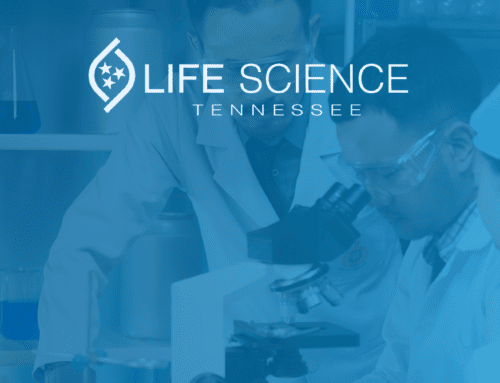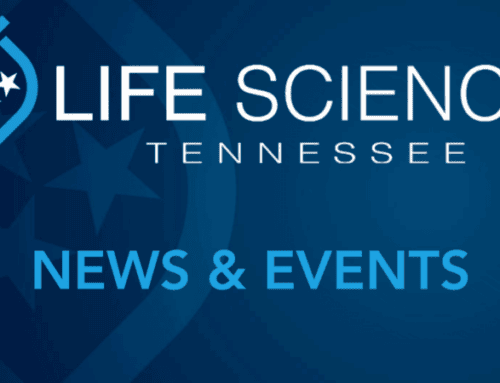The global outbreak of COVID-19 continues to disrupt business as usual and test the capabilities of our health systems. Our industry is uniquely positioned to respond to the virus.
Life Science Tennessee is actively communicating with elected officials, state agencies and industry partners to ensure Tennessee is at the forefront of combating the virus and taking proper action to keep the state safe during the global outbreak.
Below, we’ve highlighted some of the steps our members are taking to limit the spread of COVID-19 and develop drugs and therapies to treat patients. Please email Sara Pruneski if your company is working on innovative approaches to combatting COVID-19 that you would like us to highlight in the coming weeks.
The Crowe Lab at VUMC
The Crowe Lab at Vanderbilt University Medical Center (VUMC) is one of four labs working on DARPA’s Pandemic Preparedness Platform (P3) program. According to arecent report, Robert Carnahan, Ph.D., who works at the Vanderbilt Vaccine Center, says that now that they have a blood sample from a fully recovered U.S. patient, they are “doggedly pursuing neutralizing antibodies.”
The Crowe Lab at Vanderbilt University Medical Center (VUMC) is one of four labs working on DARPA’s Pandemic Preparedness Platform (P3) program. According to arecent report, Robert Carnahan, Ph.D., who works at the Vanderbilt Vaccine Center, says that now that they have a blood sample from a fully recovered U.S. patient, they are “doggedly pursuing neutralizing antibodies.”
In an interview in late January, Dr. James Crowe, Jr., an immunologist and director of the Vanderbilt Vaccine Center, provided background on their efforts and the timeline for an antibody drug.
From Dr. Crowe: “What we need to do is get blood cells from people who have survived the infection and who are now immune, and we will use their blood cells to make a biological drug. So, we are working on that process now. Also, we’ve already had some very good conversations with manufacturers and biotechs offering to engage them if we have a lead antibody drug candidate. Our goal would be to have the drug ready for clinical trials within about three months—and that would be the fastest response ever in history.”
UTHSC Research and Informational Website
The University of Tennessee Health Science Center’s (UTHSC) Regional Biocontainment Laboratory (RBL), under the leadership of Colleen Jonsson, Ph.D., professor and Endowed Van Vleet Chair of Excellence in Virology, is studying COVID-19. The RBL is one of 12 federally funded labs in the country designed to safely study dangerous pathogens. More to come on this research.
The University of Tennessee Health Science Center’s (UTHSC) Regional Biocontainment Laboratory (RBL), under the leadership of Colleen Jonsson, Ph.D., professor and Endowed Van Vleet Chair of Excellence in Virology, is studying COVID-19. The RBL is one of 12 federally funded labs in the country designed to safely study dangerous pathogens. More to come on this research.
As Tennessee’s public academic health care institution, UTHSC launched a website with information and resources about COVID-19. The site, uthsc.edu/coronavirus, is designed to be a one-stop resource for the public that includes the best available information about Coronavirus, as well as frequently asked questions and links to national, state and local organizations monitoring the virus. There is also an interactive option that allows the public to ask the experts at UTHSC questions about the virus and receive answers.
PurSolutions Services for Research Projects
The structure of the SARS-CoV-2 spike protein, discovered a few days ago, has been shown to interact with cytoskeleton filaments (i.e. microtubules and actin) for internalization into host cells—a critical step in viral pathogenesis. It has also been shown for some coronaviruses that targeting the cytoskeleton with tubulin or actin inhibitors reduces viral load.
The structure of the SARS-CoV-2 spike protein, discovered a few days ago, has been shown to interact with cytoskeleton filaments (i.e. microtubules and actin) for internalization into host cells—a critical step in viral pathogenesis. It has also been shown for some coronaviruses that targeting the cytoskeleton with tubulin or actin inhibitors reduces viral load.
PurSolutions manufactures reagents and provides services to cytoskeletal researchers that may be used to help explore and expedite coronavirus research. As tubulin and actin protein reagents may be essential tools for the discovery and cure for coronaviruses, PurSolutions is offering the following services for projects directly related to COVID-19: trial-size aliquots for testing; large batches for lot consistency; lot reservation; ship now, pay later; and same-day shipping.
ORNL Supercomputer Simulations
Oak Ridge National Lab (ORNL) researchers are using the supercomputer called “Summit” to perform simulations of more than 8,000 compounds to screen for those that are most likely to render the virus unable to infect a host. The team found 77 small-molecule compounds, such as medications and natural compounds, that they suspect may be of value for experimental testing. The full results of the study were published here.
Oak Ridge National Lab (ORNL) researchers are using the supercomputer called “Summit” to perform simulations of more than 8,000 compounds to screen for those that are most likely to render the virus unable to infect a host. The team found 77 small-molecule compounds, such as medications and natural compounds, that they suspect may be of value for experimental testing. The full results of the study were published here.
Other important updates:
- Moderna began its coronavirus vaccine trial in Washington State, reports the AP. Over the next two months, 45 volunteers ages 18-55 will get two doses of the trial vaccine. Named mRNA-1273, the vaccine uses Moderna Inc.’s messenger RNA technology, which is a faster process and produces vaccines that don’t contain any of the actual virus.
- Last week, Pfizer issued a five-point plan calling on the biopharmaceutical industry to collaborate to combat COVID-19. The plan includes: 1) Sharing tools and insights; 2) Marshalling people with a SWAT team of Pfizer’s leading virologists, biologists, chemists, clinicians, epidemiologists, vaccine experts, pharmaceutical scientists and other key experts to focus solely on addressing this pandemic; 3) Applying drug development expertise; 4) Offering manufacturing capabilities once a therapy or vaccine is approved; and 5) Improving future rapid response.



